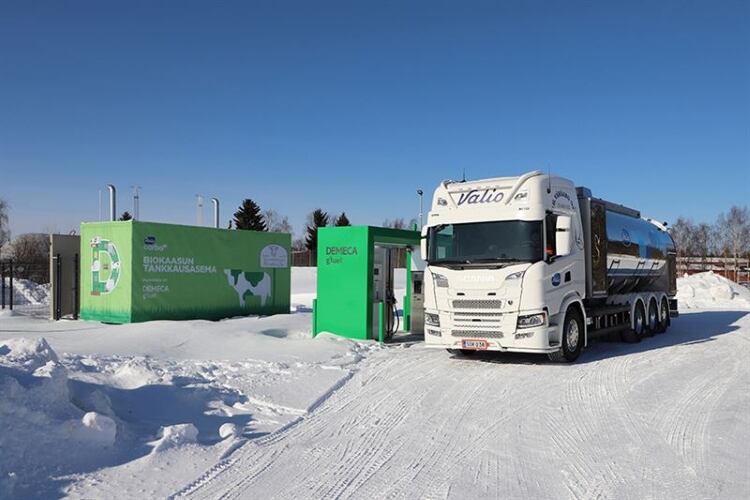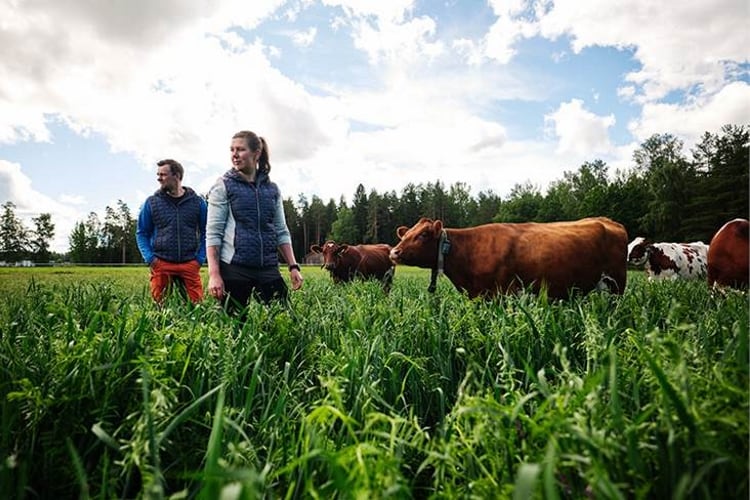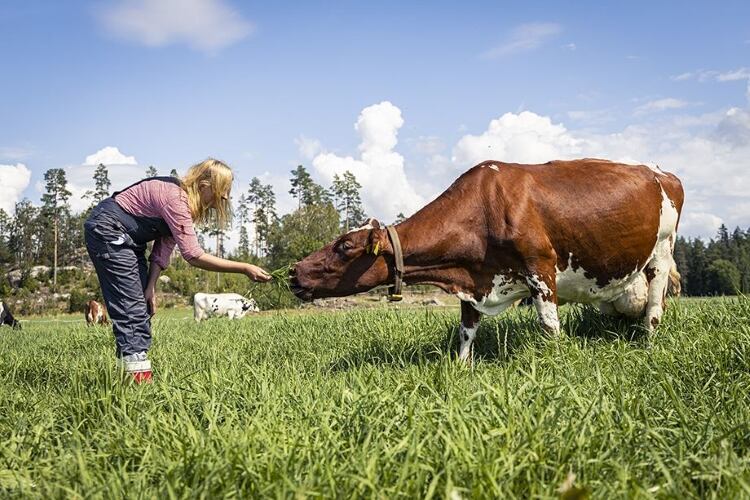Finnish dairy cooperative Valio said one solution can be found in cow manure, which can be made into biogas that can, in the future, replace fossil diesel fuel for HGVs in Finland.
The Vuorenmaa dairy farm in Haapavesi has filled Finland’s first manure-powered milk truck with the farm’s renewable biogas. Using biogas as vehicle fuel is a part of Valio’s program aiming to reset milk’s carbon footprint to zero by 2035.
The Vuorenmaa farm has 180 cows that produce milk for Valio’s local dairy, where it is made into Valio Oltermanni cheese. The farm already uses its manure to generate electricity and heat for the farm at its own biogas plant.
“The Vuorenmaa farm’s biogas plant currently produces roughly 1,900 Mwh of biogas every year. We were overhauling the plant’s equipment and decided to expand its functions to produce biogas fuel. The milk truck from our local dairy at Haapavesi can fill up at our farm at the same time as they collect our milk. In the future, the fuelling station near the farm will also provide biogas for passenger cars,” said Janne Vuorenmaa, who runs the farm with his brother and family.
How is biogas made?
Manure is fed to the biogas plant through a pipeline from the barn.
Other matter, such as grass or spoiled feed can be mixed in the manure.
The mixture is pumped into the biogas reactor, where it decomposes in an anoxic container.
The gas rises to the top of the reactor, from where it is collected and purified for use.
The process takes 30–40 days.
Initially, half of the gas produced will be refined into biomethane, which is suited for use as vehicle fuel. If all the gas were to be used in milk trucks, it would be enough for mileage of more than 350,000 kilometers per year. For now, there is only a limited amount of biogas for passenger cars. It will be possible, however, to increase the plant's refining capacity to meet demand.
Around 15m tonnes of manure is generated every year in Finland. Usage of agricultural side flows is, however, still taking its early steps in Finland, and using pressurized biogas from cow manure is a new development. Biogas will also play an important role in reducing not only traffic emissions, but also in reducing agricultural emissions.
“The biogas plant is a part of our farm’s regular nutrient circle. Its process transforms the nutrients in the manure into a form that is more useful in the fields. When we need to buy less fertilizer, it benefits both the environment and our accounts. It also improves the farm’s self-sufficiency when it comes to energy. Selling farm-produced fuel is another business opportunity,” Vuorenmaa said.
Valio’s development manager Petteri Tahvanainen, who is responsible for Valio's vehicle fleet, said, “Using biogas can reduce fuel's lifecycle greenhouse gas emissions by up to 85% compared to diesel, which is what our milk collection and distribution trucks run on. At the same time, the dairy farm's own carbon footprint goes down significantly, by one fourth or fifth, depending on the method of calculation.
“The Vuorenmaa dairy farm is a fantastic example of the ways Finnish farmers can solve environmental and climate challenges together with local businesses. At the same time, the farms can create new business, that is, new cashflow into the countryside, while improving our fuel-related self-sufficiency.”
The biogas plant and the biomethane refining and refueling station was manufactured by Demeca Oy, a company local to Haapavesi.
“We have spent a long time developing our biomethane refining unit and trialed various technical solutions. Now, a milk truck can refuel at the farm every day and the equipment is running well,” Demeca sales director Sami Vinkki said.
“We want to create new business opportunities for farmers and to improve the field’s respectability. Our job is to improve farm profitability as well as animal and human wellbeing. This is yet another project where that has been a resounding success. I very much like to refuel one of our cars at a customer’s farm. And the farm gets to keep all the profit.”
Pohjolan Maito cooperative's managing director Marko Puhto said, “A network of various local businesses has formed around the Vuorenmaa farm. They are close to the Haapavesi Cheese Factory, which means it is easy to refuel the milk truck during its collection run.”




